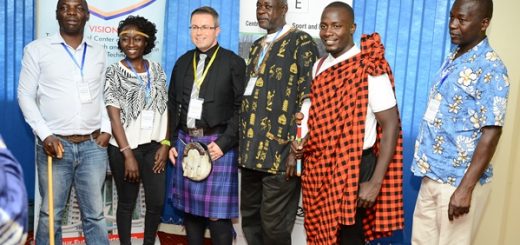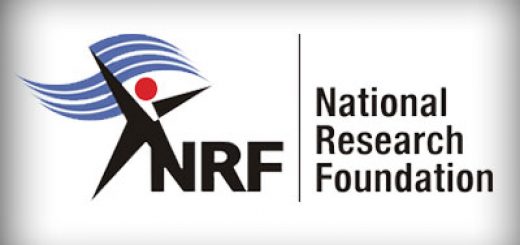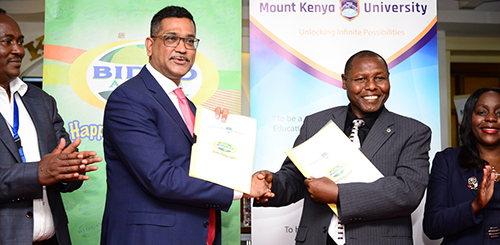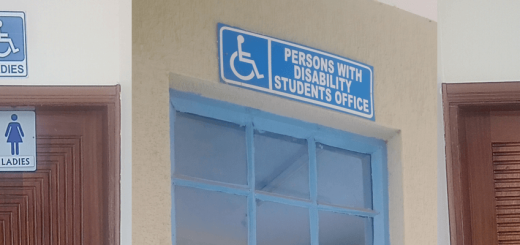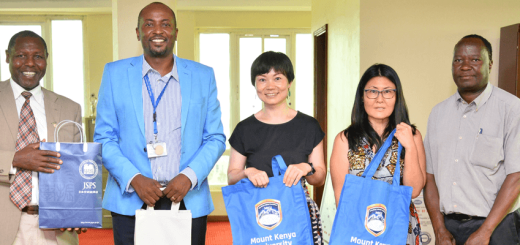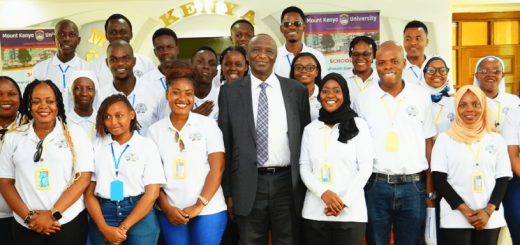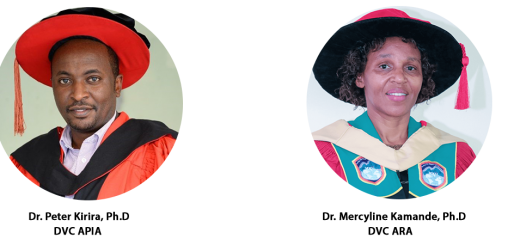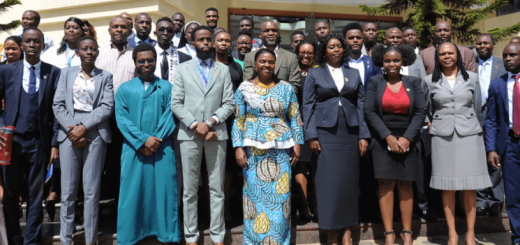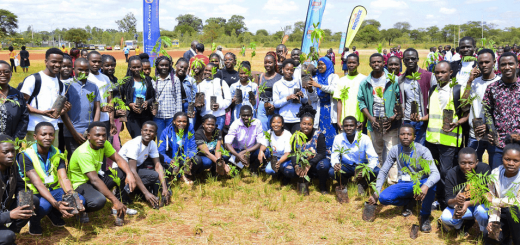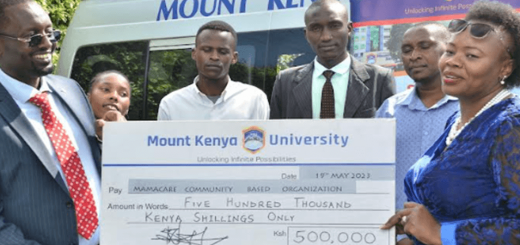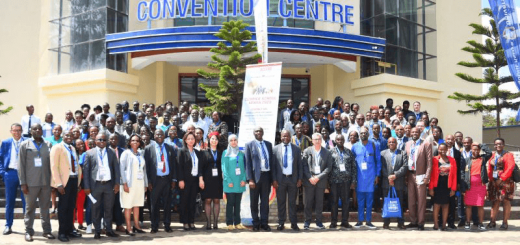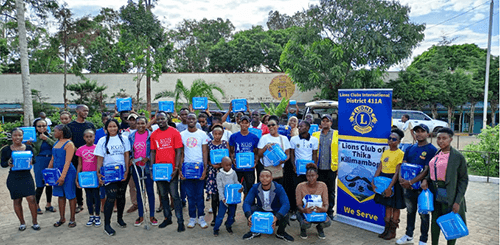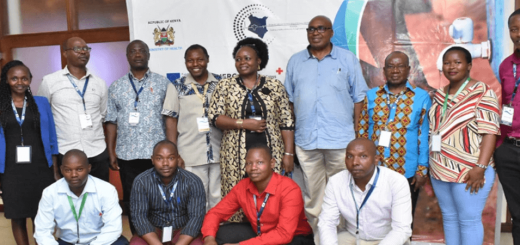Newly installed Vice-Chancellor outlines his vision for MKU
In this interview, Prof Deogratius Jaganyi, installed on January 29, 2021 as Mount Kenya University’s second Vice-Chancellor, shares his thoughts on how he sees the institution rising to new levels of excellence:
Q1. MKU has gained prominence in Research and Innovation, but can still do much more. What are your strategies as VC that will drive the university to a new level?
Therefore, in advancing scientific and scholarly knowledge we shall develop a clear and unambiguous strategy for the development of future intellectuals, academics and scholars. This will be underpinned by the acquisition of PhD qualification as a foundation principle including an enabling and exciting environment in which all academics can pursue their scholarship and studies.
MKU will embed the agenda of transformative research and innovation at the core of the institutions mandate and mainstream research function in the undergraduate and graduate programs. It will also establish centres of excellence as hubs of knowledge generation including the development of Science & Technology Park as well as Business park.
One of the flagship grand projects is the establishment of MKU Cancer, Teaching, Research and Referral Hospital (CTRRH) this will deliver knowledge, innovation and technological advancements in the fight against Cancer. The complex will also provide exciting opportunity for MKU to advance research in other medical programmes such as Biomedical Engineering and E-Health (Health Informatics)
MKU will take advantage of every opportunity to pursue the vision and mission of the University and create pathways and opportunities for our talented academics to interact, share and exchange ideas and insights with their local and international peers through physical and virtual platforms.
For research-intensive universities around the world postgraduate education is a growth area, and is no exception for MKU. MKU will therefore address the learning needs of postgraduates by developing market relevant, transformational and innovative programs. The recruitment of research students in all disciplines will be vital. This will be driven through the College of Graduate Studies and Research, the entity that has the mandate to provide the right environment for our postgraduate students ensuring the highest quality of supervision, completion rates and generic training.

Chairman Mount Kenya University Council Prof David Serem R hands over university logo and instruments of authority to the 2nd Vice Chancellor Prof Deogratius Jaganyi during the installation ceremony
Q2. How do you see MKU harnessing the technological advances of the information age to make higher education widely accessible to more Kenyans while also expanding learning platforms for its current students?
The COVID-19 pandemic has had a significant impact on higher education institutions around the world, including Kenya. The physical closure of campuses meant the rapid adoption of digital technology to ensure the continued delivery of education to students. This unplanned move to online platforms and pedagogies meant a leapfrog into a future of digital learning that most of the higher education institutions were not truly prepared for.
For MKU this represents transformative possibilities in the form of new paradigms of learning. MKU was able to seamlessly move to online teaching based on its experience and major investments in the Open, Distance and electronic Learning (ODEL) platform. The increase of online learning as a mitigating measure presented an opportunity for MKU to enhance its ICT platform to accommodate increased demand for accessibility to the programs. MKU will therefore continue to enhance blended learning and teaching going forward. This will be achieved by leveraging on current and emerging technologies to enhance access and improve quality of University Education as well as investing in the development of premium digital learning platforms.
Q3. How much can twenty-first century technologies help MKU deliver world-class education to anyone, anywhere, anytime? What is the possibility of the future of education going beyond traditional classrooms to boundless learning opportunities provided through ICT?
The 21st Century technology will change the physical classroom as we know it. These are likely to reduce but not to zero as students still need to have the social contact, networking and to develop the soft skills through human interaction. This will be achieved through the campus experience.

Prof Deogratius Jaganyi 2nd Vice Chancellor centre being robed by the Chairman University Council Prof. David Serem (Right) and MKU Pro Chancellor Dr. Vincent Gaitho (Left)
What the 21st century technology provides is the easy as to how one can access the learning material, let it be lectures, books, periodicals etc. One will not be confined to sit specific time for lectures or when to sit an exam these will be at individual’s choice. The challenge will be self-discipline, cost of data and electronic devices. In addition:
- The technologies provide transformation of the classroom experience from a classic teacher centered one into a student-centered experience – with students taking a more active role in their learning. In a student-centered classroom, the teacher becomes more of a guide as the students engage with and tackle the day’s lesson. And there is nothing better than seeing your students fully engaged! It is important to understand that integrating technology into the classroom is by no means a replacement for an effective teacher
- Technology provides teachers and students with access to a variety of educational resources that inspire creativity, critical thinking, communication, and collaboration. It promotes inclusion and the development of digital literacy skills. It extends learning beyond the text – and beyond the classroom walls. It ultimately exposes students and teachers to new online global communities. This in turn promotes a global awareness, which is an essential component to a 21st century education.
- Through the use of instructional technology, differentiated instruction can be made much easier. It can become more of a reality! With differentiated instruction, students are provided an education that is personalized – and that meets them where they are, developmentally. More students are able to benefit from this type of instruction. The use of technology also provides students access to very rich learning materials outside of the classroom.
- Finally, it is of paramount important that while in school, students use tools that will best prepare them for their future academic and professional experiences. – This includes a blend of new tech and old tech. Integrating technology into the classroom provides students with a set of skills to navigate through the variety of online tools we have today! It also provides teachers opportunities to educate students on digital citizenship and the new challenges to academic integrity
Student want a blended experience with some online learning, but also some face-to-face teaching and are looking for the “campus experience”. They want to see and interact with their professors and fellow students. Going forward flexibility is key.
Q4. What role should MKU, as a citadel of knowledge creation and dissemination, play in development thinking, especially in helping society address crises such as poverty, unemployment, climate change and the exhaustion of fossil fuel, among others?
Education remains one of the biggest tool for eradicating poverty and unemployment. This is because Education develops skills and abilities, corrects some of the imbalances that come out of marginalization, and decreases both risk and vulnerability. MKU is well position to offer affordable higher education, as it offers market relevant, transformational and innovative programs.
Through our ODEL centres MKU is making sure that education is truly for ALL, as it breaks down the barriers to education by creating access in remote areas we are also involved in supporting teachers in their work to deliver quality education.
Education is at the heart of the global response to climate change. This is because it makes people understand and address the impact of global warming. This is because it increases literacy in climate change, promoting a change in attitude and behavior. Education also empowers communities to make informed decisions, increases the adaptation of environmental friendly lifestyles. MKU therefore, has a role of educating its students and the community about the challenges of climate change and provide them with the necessary knowledge and competencies.
Q5. Let’s accept it: most institution’s corporate social responsibility programmes are token investments to boost public images. How does MKU ensure it implements a meaningful and sustainable community outreach strategy?
This may be so with other institution or organization but not for MKU.
The University will continue to contribute to the social and economic success of local and national communities through the use of its expertise and knowledge to address the challenges facing our communities. Social responsibility will be part of our research and learning activities. It will include sustainability, ethics and integrity, finding solutions to the challenges, public engagement and community support. We will focus our efforts on new areas which are not already part of our current activities. The aim is to bring about a change in culture by creating a portfolio of flagship activities that exemplifies our approach and clearly signals our intention to both internal and external stakeholders. We will also build on good practice by ensuring that a rigorous and reliable assessment of the results of our work is carried out.
Q6. It is said that most students rely on rote learning and memorization, effectively ignoring thinking, reasoning and creativity. This may not hold true at MKU, but how will you, as VC, promote the acquisition of critical thinking skills as well as the culture of inquisitiveness, problem-solving and creativity at the university?
Problem solving and critical thinking refers to the ability to use knowledge, facts, and data to effectively solve problems. It means one has to be able to think, assess a problem and find a solution. These skills can be developed through a teaching approach that involve research and experiments. Because of technology the amount of information available to students is massive. There is therefore a need to train our students on how to synthesise, analyse and evaluate information by infusing critical thinking and problem solving in our teaching approach. Some of the strategies include: the use of ongoing classroom assessment as a way to monitor and facilitate students’ critical thinking and problem solving; Cooperative Learning Strategies i.e. putting students in group learning situations to foster critical thinking and problem solving; Case Study /Discussion Method etc. These should also be reflected in both our continuous and summative assessment.
Q7. In your view, which skills do students need to be better equipped to thrive in the 21st century workplace?
The types of jobs being created are in the emerging fields (i.e. Artificial Intelligence, Blockchain, Cloud Computing, Data Analytics, Internet of Things etc) i.e. Information Communication and Technology (ICT) driven while the old require digital problem-solving skills. This is because of the Fourth Industrial Revolution. The other skills needed for the future are not just about science and technology. Human skills like creativity, leadership, responsible citizens and empathy will also be in demand.
Q8. From your experience as a trainer and researcher, you could be having insights into which ones constitute the careers of the future. Could you share those insights?
As stated in the question above, the careers of the future are driven by the Fourth Industrial Revolution. These are in the areas of Artificial Intelligence, Blockchain, Cloud Computing, Data Analytics, Internet of Things.

